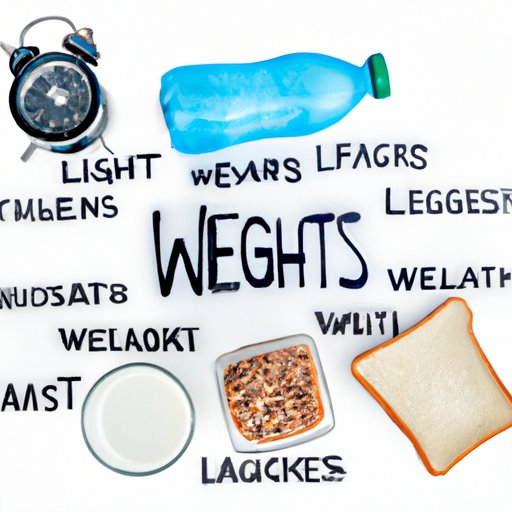
How to Quickly Lose Weight: Tips and Tricks
Losing weight can be a daunting task for many people, especially those who want to see results fast. However, by adopting certain lifestyle changes, it is possible to lose weight quickly and safely. This article will explore various tips and tricks to help you lose weight quickly, including intermittent fasting, reducing carbohydrate intake, drinking water, consistent exercise, getting enough sleep, eating fiber-rich foods, and avoiding processed foods.
Intermittent Fasting
Intermittent fasting is a dietary pattern that involves cycling between periods of fasting and eating. It has become a popular weight loss strategy because it is simple, flexible, and does not require counting calories or specific foods.
There are various types of intermittent fasting, including the 16/8 method, where you fast for 16 hours and eat within an 8-hour window, and the 5:2 method, where you consume a low-calorie diet for two days of the week and eat normally for the remaining five days.
Intermittent fasting has several benefits that can aid in weight loss, such as reducing caloric intake, increasing metabolism, and improving insulin sensitivity. However, it may not be suitable for everyone, especially those with a history of eating disorders, pregnant or breastfeeding women, and people with certain medical conditions.
If you want to try intermittent fasting, start slowly and listen to your body. Ensure that you drink plenty of water and eat nutrient-dense foods during your eating windows.
Cut Back on Carbs
Carbohydrates provide the body with energy, but consuming too many carbohydrates can lead to weight gain. Carbohydrates are also the primary macronutrient responsible for insulin secretion, which plays a key role in storing fat.
Reducing carbohydrate intake can aid in weight loss by inducing a state of ketosis, where the body burns fat for energy instead of glucose. However, it is important to consume healthy carbohydrates, such as those found in fruits, vegetables, and whole grains.
To reduce carbohydrate consumption, focus on whole, unprocessed foods and avoid sugary drinks, baked goods, and processed snacks.
Drink Water
Drinking water is essential for overall health and can also aid in weight loss. Water can help increase metabolism, flush out toxins, and suppress appetite.
To increase water intake, carry a water bottle with you throughout the day and drink water before and during meals. Avoid sugary drinks such as soda and sports drinks, which can contribute to weight gain.
Consistent Exercise
Exercise is an essential component of weight loss, as it helps burn calories, build muscle, and improve overall health. Consistency is key when it comes to exercise, as even short bursts of activity can have a positive impact on weight loss.
High-intensity interval training (HIIT) is particularly effective for weight loss, as it involves short bursts of intense exercise followed by periods of rest. Other forms of exercise, such as weightlifting, running, and cycling, are also beneficial for weight loss.
To incorporate exercise into your daily routine, set aside time each day for physical activity, choose activities that you enjoy, and vary your workouts to challenge your body and prevent boredom.
Get Enough Sleep
Getting enough sleep is crucial for overall health and can also aid in weight loss. Lack of sleep can disrupt hormones that control hunger, leading to increased appetite and overeating.
To improve sleep quality, establish a regular sleep schedule, avoid caffeine and electronics before bedtime, create a comfortable sleep environment, and practice relaxation techniques such as meditation and deep breathing.
Eat Fiber-rich Foods
Fiber is a type of carbohydrate that is not digested by the body, meaning it passes through the digestive tract largely intact. Fiber can help with weight loss by promoting feelings of fullness and reducing overall calorie intake.
Foods that are high in fiber include fruits, vegetables, whole grains, nuts, and seeds. To increase fiber intake, aim to consume at least five servings of fruits and vegetables per day and choose whole grains over refined grains.
Avoid Processed Foods
Processed foods are high in calories, unhealthy fats, and added sugars, all of which can contribute to weight gain. Processed foods also lack essential nutrients that are important for overall health.
To avoid processed foods, choose whole, unprocessed foods such as fruits, vegetables, lean proteins, and whole grains. Read food labels carefully and avoid products that contain added sugars, unhealthy fats, and artificial ingredients.
Conclusion
In conclusion, losing weight quickly and safely is achievable by making certain lifestyle changes, such as intermittent fasting, reducing carbohydrate intake, drinking water, consistent exercise, getting enough sleep, eating fiber-rich foods, and avoiding processed foods. These tips and tricks can aid in weight loss, improve overall health, and increase your confidence and energy levels. So, start your weight loss journey today and remember that small changes can lead to big results.





